America Votes 2020
Inauguration Security ...
Ahead of President-elect Joe Biden's inauguration on January 20th, law enforcement and local government officials in Washington, D.C., are implementing unprecedented security measures to avoid the kind of massive security breach that happened last week when thousands of people stormed the Capitol.
US House Impeaches Trump for Inciting Deadly Capitol Riot
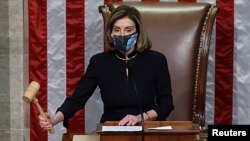
The U.S. House of Representatives impeached President Donald Trump on Wednesday, declaring that he incited insurrection last week when he implored thousands of his supporters to march to the Capitol to try to overturn his reelection loss, prompting a mob demonstration that turned into deadly mayhem.
The 232-197 majority for impeachment, with just a week remaining in Trump’s four-year term as the U.S. leader, was made up of Democratic Party lawmakers joined by 10 of Trump’s fellow Republicans.
The House vote made Trump the first of the country’s 45 presidents in its 245-year history to be impeached twice.
He was acquitted by the Senate a year ago in the first impeachment case and now will face a new trial in the weeks after President-elect Joe Biden is inaugurated next Wednesday. A two-thirds vote in the politically divided Senate would be needed to convict him. If convicted, a simple-majority vote could bar him from holding federal office again.
Damaging, deadly raid
The House impeachment vote came a week to the day after rioters stormed past overwhelmed police into the U.S. Capitol, the worldwide symbol of American democracy, during the congressional certification of the Electoral College vote showing that Biden had defeated Trump in the November election.
The throng of Trump supporters stormed into some congressional offices and ransacked them, littered the floors with government documents and scuffled with police. Five people were left dead, with three protesters dying from medical emergencies, another fatally shot by police, and a police officer killed in what authorities are investigating as a homicide.
Trump did not comment immediately Wednesday about being impeached again. But amid warnings of more violence surrounding Biden’s inauguration next week, he issued a statement urging that there "must be NO violence, NO lawbreaking, NO vandalism of any kind. That is not what I stand for, and it is not what America stands for. I call on ALL Americans to help ease tensions and calm tempers."
As Wednesday’s impeachment debate started, House Speaker Nancy Pelosi, the top Democrat in the chamber, called Trump a threat to “liberty, self-government and the rule of law.”
But a staunch Trump supporter, Representative Jim Jordan of Ohio, said impeachment “doesn’t unite the country. This is about politics.” Democrats, he said, “want to cancel the president.”
The thin Democratic majority in the House had enough votes on its own to impeach Trump a week before his term ends at noon on January 20 and Biden, a Washington political figure for nearly 50 years, is inaugurated as the country’s new leader.
10 Republican votes
But 10 Republicans, including Representative Liz Cheney of Wyoming, the party’s third-ranking House member, joined opposition Democrats in impeaching Trump. In announcing her vote for impeachment Tuesday night, she said there “has never been a greater betrayal” by a U.S. president.
The House, with no Republican votes, impeached Trump in late 2019 for trying to get Ukraine to dig up negative information on Biden ahead of the November election. But he was acquitted in February after a 20-day Senate trial.
Biden won the presidency in a decisive Electoral College vote that is determinative in U.S. presidential elections. Congress last Thursday certified the Electoral College outcome, but not before the pro-Trump mob delayed the certification for hours before authorities restored order.
As the House debated the ground rules for the impeachment proceeding, Democratic Representative Jim McGovern of Massachusetts, “We wouldn’t be here if it weren’t for the president of the United States,” adding that “the cause of this violence resides at 1600 Pennsylvania Avenue,” the White House address.
At a rally a week ago, Trump urged his supporters to march to the Capitol and “fight” to overturn his election loss.
House Majority Leader Steny Hoyer of Maryland said Trump had “brought shame and disorder to the presidency” and had “weaponized hate.”
But Representative Tom Cole, an Oklahoma Republican, opposed Trump’s impeachment, saying, “I can think of nothing that would cause further division more than the path the majority is now taking. Rather than looking ahead to a new administration, the majority is again seeking to settle scores against the old one.”
'Reckless' action
Representative Jason Smith of Missouri, another Republican, said, “Let’s put people before politics. This is a reckless impeachment.”
House Republican leader Kevin McCarthy of California, a close Trump ally, said, “Impeachment at this time would have the opposite effect of bringing our country together.” But the Republican leadership said it would not try to pressure party members to vote against impeachment.
On a visit Tuesday to the U.S.-Mexico border, Trump said the push to impeach him again was “causing tremendous anger and division and pain far greater than most people will ever understand, which is very dangerous for the USA, especially at this very tender time.”
He urged “peace and calm” and said now was a “time for law and a time for order.”
Trump, who in a video last week told the mob of his supporters, “We love you. You’re very special,” did not answer questions from reporters.
It was unclear whether House leaders would immediately send the impeachment resolution to the Senate, given that Trump’s term ends in a week.
The impeachment resolution cites Trump’s unfounded accusations that he was cheated out of a second term by voting and vote-counting irregularities; his pressure on election officials in the Southern state of Georgia to “find” him more than 11,000 votes to overtake Biden’s margin of victory in the state; and his statements at a rally last Wednesday urging thousands of supporters to march to the Capitol to pressure lawmakers to overturn the election outcome.
Trial, appointments, COVID aid
Biden said it was his “hope and expectation” that the Senate could simultaneously hold an impeachment trial and confirm his Cabinet appointments after he takes office, while also approving more aid for the U.S. economy that has been weakened by the coronavirus pandemic.
“It is critically important that there’ll be a real serious focus on holding those folks who engaged in sedition and threatening lives, defacing public property, caused great damage — that they be held accountable,” he said Monday of the rioters.
Dozens of rioters already have been arrested, and federal authorities are investigating many more, scouring security videos at the Capitol to identify wrongdoers and searching social media videos the rioters posted of themselves in the building.
VOA Director Reassigns White House Correspondent
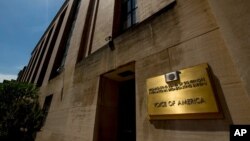
In a rebuke from Congress, U.S. Representatives Gregory Meeks of New York and Michael McCaul of Texas chastised the heads of USAGM and Voice of America on Tuesday for reassigning a VOA White House correspondent.
Patsy Widakuswara was told late Monday she is being reassigned, hours after the veteran reporter attempted to question Secretary of State Mike Pompeo following a speech he delivered at VOA headquarters.
“This is the United States of America – we do not punish our journalists for seeking answers to their questions. A free and fair press is at the core of our Constitution and our democracy,” Meeks, the new chair of the House Foreign Affairs Committee, and lead Republican McCaul said in a joint statement. The lawmakers called for VOA to explain its actions and to reinstate Widakuswara.
Widakuswara was informed at around 10:30 p.m. Monday that she was being moved to general reporting instead of the high-profile White House job. No reason was provided.
A VOA spokesperson replied to questions about Widakuswara’s reassignment and said the news organization does not comment on personnel matters. USAGM did not respond.
VOA directors have the authority to reassign staff as they see fit. But journalism groups and a whistleblower agency criticized the move as an attack on press freedom.
Although VOA is taxpayer funded, its journalists operate under a “firewall” framework designed to protect their independence from politics. That tradition has been challenged, however, by CEO Michael Pack, the Trump appointee who took over as chief of VOA’s parent agency, USAGM, in June.
The actions taken against Widakuswara are an “assault on the First Amendment,” Zeke Miller, president of the White House Correspondents Club, said in a statement.
“VOA’s reassignment of Patsy Widakuswara for doing her job, asking questions, is an affront to the very ideals Secretary of State Pompeo discussed in his speech,” Miller said.
He added that removing Widakuswara from her beat “harms the interests of all Americans who depend on the free press to learn about the actions of their government and gives comfort to efforts to restrict press freedom around the world.”
Widakuswara had been due to travel with President Donald Trump on Tuesday to cover his visit to Texas for VOA’s audience. The visit is Trump’s first public appearance since his supporters violently breached the U.S. Capitol last week, resulting in five deaths including that of a Capitol police officer.
Even before Pompeo spoke, the Government Accountability Project, which protects federal whistleblowers, had written to USAGM to warn that the arrangements for covering the address appeared to violate the VOA Charter – which enshrines the agency’s editorial independence – and journalism ethics.
"Patsy was doing her job. Her ‘reassignment’ is retaliatory political meddling. That's an illegal breach of the firewall,” David Seide, senior counsel for GAP, told VOA. The organization is representing over 20 current and former journalists who contacted it over various concerns in recent months.
In their joint statement, McCaul and Meeks said they were frustrated to learn that Widakuswara was reassigned after questioning Pompeo. “Absent a legitimate reason for this move, which has not been provided, we believe she should be reinstated,” they said. “This is the United States of America – we do not punish our journalists for seeking answers to their questions. A free and fair press is at the core of our Constitution and our democracy.”
On Monday, Pompeo spoke about “American exceptionalism” in a speech at VOA and what he viewed as the proper role of VOA in promoting American values around the globe. It was followed by a brief Q&A session with Reilly, who did not pose questions submitted by the agency’s main newsroom about last week’s assault on the Capitol or Pompeo’s move that morning to declare the Houthis in Yemen as a terrorist organization.
As the secretary of state left the network’s headquarters, Widakuswara followed and tried to question Pompeo.
Video shows Widakuswara calling out questions to Pompeo as he left the VOA building, including whether he regretted saying that there would be a smooth transition to a “second Trump administration” despite Trump’s loss to Democrat Joe Biden.
In footage, the journalist is heard pivoting to Reilly and asking why he didn’t ask questions that journalists want to know the answers to.
In response, the director is heard asking Widakuswara who she is. After she introduces herself, he tells the reporter, “You obviously don’t know how to behave” and adds that she is not authorized to ask questions.
Widakuswara responds by saying she is a journalist and that her job is to ask questions.
Until being reassigned, Widakuswara covered the White House for VOA’s website, TV and radio, and also hosted a podcast for the Indonesian language service, where she started as a reporter.
In his speech at VOA headquarters, Pompeo implored the network’s journalists to carry out VOA’s mission and uphold press freedom.
The outgoing secretary of state also criticized a group of the agency’s journalists after the GAP wrote on their behalf to Pack and Reilly citing concerns that airing a live broadcast of a government official risked violating VOA’s laws and rules.
The decision by VOA management to broadcast Pompeo’s speech live was criticized as potentially damaging to the network’s credibility.
Allowing a senior U.S. official’s speech to be broadcast live is an attempt to reduce VOA to state broadcaster, Nick Cull, a professor of public diplomacy at the University of Southern California Annenberg School for Communication and Journalism, told VOA.
“When a government official goes down to a state-subsidized broadcaster and insists that particular propaganda be broadcast, that is so self-defeating and undermines any claims that broadcaster might make to being objective,” Cull said. “It reduces Voice of America to the level of not just state-funded broadcaster, but a state broadcaster.”
Criticism over Widakuswara’s removal from the White House beat is the latest move by the agency to draw fire from lawmakers and whistleblower protection groups over Pack’s management of the agency and alleged attempts to interfere in VOA’s editorial independence.
A U.S. District Court in November barred Pack and his aides from directly interfering in VOA until a lawsuit alleging violations of the firewall is settled; the Office of the Inspector General sent letters to Pack reminding the chief executive of protections whistleblowers have from retaliation; and the Office of Special Counsel ordered the CEO to investigate allegations of wrongdoing by its own officials.
Handful of Republican Lawmakers Say They Will Vote to Impeach Trump
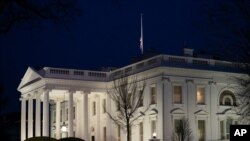
A small but growing number of Republican lawmakers is signaling support for impeaching President Donald Trump after his supporters stormed the U.S. Capitol last Wednesday to try to upend his reelection defeat, leaving five people dead.
Rep. Liz Cheney of Wyoming, a member of the Republican Party’s House leadership team, said Tuesday that she would vote to impeach Trump in his final days as president.
“There has never been a greater betrayal by a President of the United States of his office and his oath to the Constitution,” Cheney said.
Also on Tuesday, New York representative John Katko and Illinois representative Adam Kinzinger, both Republicans, said they would vote to impeach the president.
Third House Republican to vote for #impeachment https://t.co/HxQPJ9VVtV
— Katherine Gypson (@kgyp) January 12, 2021
While Republicans voted lockstep against impeaching Trump last year for pressuring Ukraine to investigate Democrat Joe Biden, who is now president-elect, House Republican leaders are indicating they do not intend to pressure their members to vote against impeachment this time around.
A total of 218 Democrats have signed on to the impeachment resolution, ensuring a majority in the 435-member House with or without any Republican votes against the outgoing Republican president.
While an impeachment resolution would be almost certain to pass, conviction by the Senate and removal from office is far from certain.
It is unclear whether House leaders would immediately send the impeachment resolution to the Senate for a trial on whether to convict Trump and remove him from office, given that his term ends next week.
The House is set to vote Tuesday on a resolution calling for Vice President Mike Pence and members of Trump’s Cabinet to use their constitutional authority to remove Trump from office as unfit to serve.
The measure, which is expected to pass, sets a 24-hour deadline for Pence to respond, but he has given no indication he supports the removal of Trump. That would set the stage for a House vote Wednesday on impeachment.
“The President represents an imminent threat to our Constitution, our Country and the American people, and he must be removed from office immediately,” House Speaker Nancy Pelosi said in a written statement on Monday.
Aside from Pence, no Cabinet member has given any public indication of supporting Trump’s ouster in the waning days of his presidency through use of the 25th Amendment to the U.S. Constitution, which allows for the vice president and a majority of the Cabinet to declare a president “unable to discharge the powers and duties of his office.”
Trump and Pence met late Monday at the White House for the first time since last week. Pence had angered Trump by rebuffing his entreaties to reject the Electoral College votes from several states Biden narrowly won, giving him the presidency.
A senior administration official said Trump and Pence “reiterated that those who broke the law and stormed the Capitol last week do not represent the America First movement backed by 75 million Americans [who voted for Trump] and pledged to continue the work on behalf of the country for the remainder of their term.”
Even though Trump’s four-year term expires at noon Jan. 20, the four-page proposed House impeachment resolution said Trump has “demonstrated that he will remain a threat to national security, democracy, and the Constitution if allowed to remain in office, and has acted in a manner grossly incompatible with self-governance and the rule of law.”
The impeachment resolution cites Trump’s unfounded accusations that he was cheated out of a second term by voting and vote-counting irregularities, his pressure on election officials in the southern state of Georgia to “find” him more than 11,000 votes to overtake Biden’s margin of victory in the state, and his statements at a rally last Wednesday urging thousands of supporters to march to the Capitol to pressure lawmakers to overturn the election outcome.
Biden said it is his “hope and expectation” that the Senate could simultaneously hold an impeachment trial and confirm his Cabinet appointments after he takes office, while also approving more aid for the flagging U.S. economy weakened by the soaring coronavirus pandemic.
He said Monday of the rioters, “It is critically important that there’ll be a real serious focus on holding those folks who engaged in sedition and threatening the lives, defacing public property, caused great damage — that they be held accountable.”
Biden also told reporters, “I’m not afraid of taking the oath outside," referring to next week’s swearing-in ceremony, which traditionally takes place at the U.S. Capitol's west steps, one of the areas where people stormed the building.
Even if Trump has already left office, a Senate impeachment conviction after his term ends would bar him from holding federal office again.
Republican Congressman Tom Reed said in a New York Times opinion piece that he would join an unspecified number of House colleagues in introducing a censure resolution against Trump on Tuesday as an alternative to a “hasty impeachment.”
“If our leaders make the wrong decision in how to hold him accountable, it could damage the integrity of our system of justice, further fan the flames of division, and disillusion millions of Americans ─ all while failing to accomplish anything,” Reed wrote.
If he is impeached again, Trump would hold a singular distinction among 45 U.S. presidents in the 245-year history of the United States, by becoming the only chief executive to be impeached twice.
Katherine Gypson contributed to this report.
Some Republican Lawmakers Say They Will Vote to Impeach Trump
The U.S. House of Representatives is expected to vote Wednesday on the unprecedented second impeachment of President Donald Trump. Democrats hold a majority in the chamber and have enough votes to approve impeachment on their own, but they are being joined by a growing number of Republicans.
FBI Looking at Threats to Biden's Inauguration
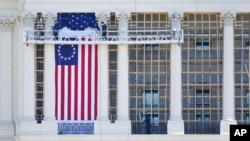
Concerns are growing that the storming of the U.S. Capitol last week by extremists supporting U.S. President Donald Trump may be the start of what could be a series of potentially armed and violent protests across the country leading up to the inauguration of President-elect Joe Biden.
The Federal Bureau of Investigation on Monday told VOA it is examining evidence suggesting groups or individuals may be looking to incite violence or engage in criminal activity in connection with the planned transfer of power.
"While our standard practice is to not comment on specific intelligence products, the FBI is supporting our state, local and federal law enforcement partners," the bureau said in a statement.
"Our focus is not on peaceful protesters, but on those threatening their safety and the safety of other citizens with violence and destruction of property," the statement added.
An FBI bulletin, first obtained by ABC News and Yahoo News, likewise cautions about the potential for violence, in Washington as well as in all 50 states.
The FBI has "received information about an identified armed group intending to travel to Washington, D.C., on 16 January," the bulletin said. "They have warned that if Congress attempts to remove POTUS via the 25th Amendment a huge uprising will occur."
The bulletin further warned that a group is calling for the storming of state, local and federal buildings should efforts to remove Trump from office before the January 20 inauguration succeed.
While not commenting on the specific threats, other government agencies are taking steps to bolster security.
The Department of Homeland Security (DHS) announced Monday it is directing the U.S. Secret Service, normally tasked with presidential security, to start its inauguration security operation this Wednesday, six days earlier than planned.
DHS cited "events of the past week and the evolving security landscape," as the reason for the change.
National Guard
Earlier Monday, the U.S. National Guard said it had authorized up to 15,000 members to assist with security efforts for the January 20 inauguration.
"To date, our troops have been requested to support security, logistics, liaison, and communication missions," Gen. Daniel Hokanson, chief of the National Guard Bureau, said in a statement.
NEW: @USNationalGuard authorized to "provide up to 15,000 Guard members to meet current & future inauguration support requirements...to support security, logistics, liaison, & communication missions" following requests from Capitol Police, @NatlParkService, per @ChiefNGB pic.twitter.com/5KhGFK3QwO
— Jeff Seldin (@jseldin) January 11, 2021
Guard officials said 6,200 troops from six states are in Washington supporting civilian authorities in the aftermath of last Wednesday's riot, during which the U.S. Capitol was briefly overrun by thousands of pro-Trump extremists, leaving five people dead.
The National Guard has a long history of helping to secure U.S. presidential inaugurations; about 8,000 National Guard members were present during Trump's inauguration in 2016.
The U.S. National Park Service also announced Monday it will close the Washington Monument from January 11 until after the inauguration, citing threats of violence.
"Groups involved in the January 6, 2021, riots at the U.S. Capitol continue to threaten to disrupt the 59th presidential inauguration on January 20, 2021," NPS wrote in a statement on its website.
The NPS said other parts of the National Mall and roadways could be blocked in the coming weeks, as well.
Emergency declaration
In addition, the White House late Monday announced Trump approved an emergency declaration for Washington, lasting until January 24, four days after the inauguration.
The move clears the way for key federal agencies, including DHS and the Federal Emergency Management Agency (FEMA) to coordinate and mobilize emergency assistance should it be needed.
But there is also some concern the heightened security may be needed beyond the inauguration.
"The State of the Union [presidential address to Congress] is just around the corner," Terry Gainer, a former chief for the Capitol Police who also served as the Senate Sergeant-at-arms, told a webinar Monday.
"The Right to Life March will happen [January 29]," Gainer added. "The ongoing discussions with the impeachment – all sorts of things that would attract wrongdoers to come there, as well as protesters who should legitimately protest and have a right to do it."
In contrast to the latest warnings and increased precautions, both the FBI and the Washington Metropolitan Police have said there was no intelligence before last Wednesday's planned protests to suggest portions of the crowd could become violent.
Allegations of pushback
Outgoing U.S. Capitol Police Chief Steven Sund has told The Washington Post that he met with pushback from military officials, and that security officials in the House of Representatives and the Senate denied his request to ask the National Guard to be ready to help ahead of last week's attack on the U.S. Capitol.
"If we would have had the National Guard, we could have held them at bay longer until more officers from our partner agencies could arrive," Sund told the Post.
But the U.S. Army late Monday refuted Sund's suggestions that military officials sought to deny any requests for help.
"I did not make the statement or any comments similar to what was attributed to me by Chief Sund in the Washington Post article," Lt. Gen. Walter Piatt, the Director of the Army Staff, countered in a statement.
"But [I] would note that even in his telling he makes it clear that neither I, nor anyone else from DoD, denied the deployment of requested personnel," Piatt added.
A Pentagon spokesman said last week that U.S. Capitol Police did not make a request for National Guard backup before the riot that left five people dead, including a Capitol police officer. A second officer who responded to the assault on the Capitol died off duty.
Pro-Trump rioters overwhelmed the outnumbered Capitol Police and spent several hours inside the building Wednesday as security rushed lawmakers to safety. Authorities took hours reasserting control of the building, with Capitol Police eventually getting help from the National Guard, local police and federal law enforcement agencies.
In the wake of the attack, several lawmakers have questioned Capitol Police preparation. Sund, Senate Sergeant-at-Arms Michael Stenger and House Sergeant-at-Arms Paul Irving have all resigned.
VOA's Esha Sarai contributed to this report.
US House Moves to Remove Trump from Office

The Democrat-majority U.S. House of Representatives is expected to vote Tuesday on a resolution calling for Vice President Mike Pence and members of President Donald Trump’s Cabinet to use their constitutional authority to remove Trump from office.
The measure, which is expected to pass, sets a 24-hour deadline for Pence to respond.
“The President represents an imminent threat to our Constitution, our Country and the American people, and he must be removed from office immediately,” House Speaker Nancy Pelosi said in a statement Monday.
Neither Pence nor any Cabinet member has given public indication of supporting such action involving the 25th Amendment’s provision allowing for the vice president and a majority of the Cabinet to declare a president “unable to discharge the powers and duties of his office.”
Trump and Pence met late Monday at the White House for the first time since pro-Trump rioters attacked the U.S. Capitol last week.
A senior administration official said the two “reiterated that those who broke the law and stormed the Capitol last week do not represent the America first movement backed by 75 million Americans, and pledged to continue the work on behalf of the country for the remainder of their term.”
Pence drew Trump’s anger by rejecting the president’s efforts to overturn their November election loss to President-elect Joe Biden and Vice President-elect Kamala Harris.
House leaders are also pushing ahead with a separate impeachment resolution that lawmakers are scheduled to begin considering Wednesday morning.
Even though Trump’s four-year term expires at noon January 20, the four-page impeachment resolution said Trump has “demonstrated that he will remain a threat to national security, democracy, and the Constitution if allowed to remain in office, and has acted in a manner grossly incompatible with self-governance and the rule of law.”
The four-page impeachment resolution cites Trump’s unfounded accusations that he was cheated out of a second four-year term by vote and vote-counting irregularities, his pressure on election officials in the southern state of Georgia to “find” him more than 11,000 votes to overtake Biden’s margin of victory in the state, and his statements at a rally last Wednesday urging thousands of supporters to march to the Capitol to pressure lawmakers to overturn the election outcome.
A total of 218 Democrats have signed on to the resolution, ensuring a majority in the 435-member House without any Republican votes against the outgoing Republican president.
But it is unclear whether House leaders would immediately send the resolution to the Senate for a trial on whether to convict Trump and remove him from office, given that his term ends next week.
Biden said it is his “hope and expectation” that the Senate could simultaneously hold an impeachment trial and confirm his Cabinet appointments after he takes office, while also approving more aid for the flagging U.S. economy weakened by the soaring coronavirus pandemic.
He said Monday of the rioters, “It is critically important that there’ll be a real serious focus on holding those folks who engaged in sedition and threatening the lives, defacing public property, caused great damage — that they be held accountable.”
Biden also told reporters, “I’m not afraid of taking the oath outside," referring to next week’s swearing-in ceremony, which traditionally takes place at the U.S. Capitol's west steps, one of the areas where people stormed the building.
Even if Trump has already left office, a Senate impeachment conviction after his term ends could mean he would not hold federal office again.
Republican Congressman Tom Reed said in a New York Times opinion piece that he would join an unspecified number of House colleagues in introducing a censure resolution against Trump on Tuesday as an alternative to a “hasty impeachment.”
“If our leaders make the wrong decision in how to hold him accountable, it could damage the integrity of our system of justice, further fan the flames of division, and disillusion millions of Americans ─ all while failing to accomplish anything,” Reed wrote.
Trump, banned from Twitter for his false, incendiary comments alleging election fraud, has not publicly commented on the effort to impeach him a second time, which would give him a singular distinction among 45 U.S. presidents in the 245-year history of the United States.
The House impeached him the first time in late 2019, accusing him of trying to get Ukraine to dig up dirt on Biden ahead of last November’s election, but the Senate acquitted him in early February.
At last Wednesday's rally near the White House, Trump told several thousand people, “If you don’t fight like hell, you’re not going to have a country anymore.”
The largely white mob that walked to the Capitol quickly overwhelmed police there, storming inside in droves, breaking windows, ransacking some congressional offices and scuffling with security officials.
Dozens of Trump supporters have been arrested, and authorities are scouring security videos and social media accounts the rioters posted of themselves inside the Capitol to identify other wrongdoers. Five people died in the mayhem, including a police officer whose death is being investigated as a homicide.
Trump has refused to concede his defeat or congratulate Biden, but he has acknowledged there will be a “new administration” come January 20.
Trump has announced that he will not attend Biden’s inauguration, ignoring a long-standing tradition in the United States of an outgoing chief executive witnessing his successor take office as a show of the peaceful transition of power in the U.S. democracy.
Pence, however, does plan to attend the ceremony, which will be downscaled significantly because of the surging number of coronavirus cases in the United States.
Capitol Police Were Overrun, 'Left Naked' Against Rioters

Despite ample warnings about pro-Trump demonstrations in Washington, U.S. Capitol Police did not bolster staffing on Wednesday and made no preparations for the possibility that the planned protests could escalate into massive violent riots, according to several people briefed on law enforcement’s response.
The revelations shed new light on why Capitol Police were so quickly overrun by rioters. The department had the same number of officers in place as on a routine day. While some of those officers were outfitted with equipment for a protest, they were not staffed or equipped for a riot.
Once the mob began to move on the Capitol, a police lieutenant issued an order not to use deadly force, which explains why officers outside the building did not draw their weapons as the crowd closed in. Officers are sometimes ordered against escalating a situation by drawing their weapons if superiors believe doing so could lead to a stampede or a shootout.
In this instance, it also left officers with little ability to resist the mob. In one video from the scene, an officer puts up his fists to try to push back a crowd pinning him and his colleagues against a door. The crowd jeers “You are not American!” and one man tries to prod him with the tip of an American flag.
“They were left naked,” Rep. Maxine Waters, D-California. said of the police in an interview with AP. She had raised security concerns in a Dec. 28 meeting of House Democrats and grilled Steven Sund, the Capitol Police chief, during an hourlong private call on New Year’s Eve. “It turns out it was the worst kind of non-security anybody could ever imagine.”
The Capitol Police’s lackluster response to the riots, poor planning and failure to anticipate the seriousness of the threat have drawn condemnation from lawmakers and prompted the ouster of the department’s chief and the Sergeants at Arms of both the House and Senate.
As the full extent of the insurrection becomes clear, the FBI is also investigating whether some of the rioters had plans to kidnap members of Congress and hold them hostage.
Investigators are particularly focused on why some of them were seen carrying plastic zip-tie handcuffs and had apparently accessed areas of the Capitol generally difficult for the public to locate, according to an official.
The official was among four officials briefed on Wednesday’s incident who spoke to The Associated Press on the condition of anonymity because they were not authorized to discuss the ongoing investigation publicly.
Larry Rendell Brock, of Texas, and Eric Gavelek Munchel, of Tennessee, who both were photographed with plastic restraints as they broke into the Capitol, were arrested by the FBI on Sunday. Prosecutors said Brock also donned a green helmet, tactical vest and camouflage jacket.
The crowd that arrived in Washington on Wednesday was no surprise. Trump had been urging his supporters to come to the capital and some hotels had been booked to 100% capacity - setting off alarm bells because tourism in Washington has cratered amid the pandemic. Justice officials, FBI and other agencies began to monitor flights and social media for weeks and were expecting massive crowds.
A leader of the far-right extremist group Proud Boys was arrested coming into the city with high-powered magazine clips emblazoned with the group’s logo, police said. The clips were not loaded, but he was planning to attend a rally near the White House.
Capitol Police leaders, however, had prepared for a free speech demonstration. No fencing was erected outside the Capitol and no contingency plans were prepared in case the situation escalated, according to people briefed.
Rep. Jason Crow, a Democrat from Colorado, said Army Secretary Ryan McCarthy told lawmakers on Sunday that the Defense Department and law enforcement officials had prepared for a crowd similar to protests in November and December, in the “low thousands” and that they had been preparing for small, disparate violent events, like stabbings and fist fights. McCarthy also said Sund and Mayor Muriel Bowser had called for urgent reinforcements from the Defense Department as the crowd surged toward officers but were “unable to articulate what resources are needed and in what locations, due to chaos.”
Waters grilled Sund on exactly these kinds of questions -- about the Proud Boys and other groups coming, about keeping them off the Capitol plaza. The police chief insisted they knew what they were doing.
“He kept assuring me he had it under control — they knew what they were doing,” she said. “Either he’s incompetent, or he was lying, or he was complicit.”
Those decisions left the officers policing the Capitol like sitting ducks, the officials said, with little guidance and no cohesive plan on how to deal with the flood of rioters streaming into the building.
The department’s leaders were also scattered during the riots. The chief of police was with Vice President Mike Pence in a secure location, and other high-ranking officials had been dispatched to the scene of bombs found outside the nearby headquarters of the Republican and Democratic national committees.
The rioters had more equipment, and they weren’t afraid to use it, said Ashan Benedict, who leads the Washington field division for the Bureau of Alcohol, Tobacco, Firearms and Explosives and was there that day.
“They had apparently more bear spray and pepper spray and chemical munitions than we did,” Benedict said. “We’re coming up with plans to counteract their chemical munitions with some of our own less-than-lethal devices, so these conversations are going on as this chaos is unfolding in front of my eyes.”
Officers have been criticized for their actions after snippets of videos taken by the rioters showed some posing for selfies, acquiescing to demands by screaming rioters to move aside so they could stream inside the building.
But other videos show officers trying in vain to keep the crowd from breaking into the building. One disturbing video shows a bloodied Metropolitan police officer screaming for help as he’s crushed by protesters inside the Capitol building. The young officer is pinned between a riot shield and metal door. Bleeding from the mouth, he cries out in pain and screams, “Help!”
In another stunning video, a lone police officer tries to hold off a mob of demonstrators from breaking into the lobby. He fails.
One officer died in the riot and at least a dozen were injured. The officials wouldn’t reveal the specific number of officers on-duty over concerns about disclosing operational details but confirmed that the numbers were on par with a routine protest and day where lawmakers would be present.
Capitol Police officials did brief lawmakers ahead of Wednesday, saying they expected large numbers of protesters to attend a rally near the White House, but offered no indication they were preparing for an en masse movement of the crowd to the Capitol, according to one Republican congressional aide. Still, they advised lawmakers to plan to use the underground tunnels that connect House office buildings to the Capitol.
Benedict was at the bomb scene when Capitol Police captains there told him their officers were being overrun.
He immediately activated the special response team that was standing by and began to call in every ATF agent who works for him in Washington.
When they began entering the Capitol complex at 2:40 p.m., the hallways were packed with rioters.
Eventually, federal agents were able to secure the Capitol Rotunda.
“We just started moving crowds of people out of the Capitol Complex and then going through one by one, each room and rooms off of rooms, to identify friendlies from hostiles,” he said.
Melania Trump: ‘Disappointed and Disheartened’ by Storming of US Capitol

U.S. first lady Melania Trump on Monday said she was “disappointed and disheartened” by the storming of the U.S. Capitol by a mob of supporters of her husband looking to overturn his loss for re-election, but also said it was “shameful” that she was the subject of what she characterized as “salacious gossip” and “unwarranted personal attacks.”
In a statement from the White House, the first lady voiced her grief at the deaths of six people linked to last Wednesday’s mayhem at the Capitol, including Capitol Police officer Brian Sicknick, and a second officer, Howard Liebengood, who had responded to the chaos at the Capitol but committed suicide over the weekend while off duty.
“Our nation must heal in a civil manner,” Melania Trump said. “Make no mistake about it, I absolutely condemn the violence that has occurred on our nation’s Capitol. Violence is never acceptable.”
She added, “I implore people to stop the violence, never make assumptions based on the color of a person’s skin or use differing political ideologies as a basis for aggression and viciousness. We must listen to one another, focus on what unites us, and rise above what divides us.”
President Donald Trump urged thousands of his supporters to march to the Capitol during a January 6 rally near the White House where, as he had for weeks, leveled unfounded accusations that he was cheated out of re-election.
Hours later as his supporters stormed the Capitol, he urged them to “go home” but also told them, "We love you, you're very special."
In the early hours of January 7, after police restored order in the Capitol, lawmakers certified the Electoral College victory of Democrat Joe Biden, who is set to be inaugurated as the country’s 46th president in nine days.
The first lady on Monday also pushed back against those who had questioned her silence about the Capitol building violence until this point.
“I find it shameful that surrounding these tragic events there has been salacious gossip, unwarranted personal attacks, and false misleading accusations on me — from people who are looking to be relevant and have an agenda,” she said. “This time is solely about healing our country and its citizens. It should not be used for personal gain.”
She may have been directing her comments at least in part at Stephanie Winston Wolkoff, a former adviser and friend who wrote in a Daily Beast article over the weekend that Melania Trump has been an enabler of her husband and has “blood on her hands.”
“I wish I could say I was shocked by President Trump’s actions, but sadly I cannot, or say I don’t comprehend Melania’s silence and inactions, but pathetically, they are both expected,” Wolkoff wrote. “Melania knows how to ‘Be Best’ at standing up and reading from a teleprompter and not from the heart. She and her husband lack character and have no moral compass.”
Melania Trump also appeared to be saying farewell to her time in the White House before her husband’s term ends at noon on January 20.
“It has been the honor of my lifetime to serve as your First Lady,” she said.
“I want to thank the millions of Americans who supported my husband and me over the past 4 years and shown the incredible impact of the American spirit. I am grateful to you all for letting me serve you on platforms which are dear to me.”
President Trump on Monday ordered American flags to be flown at half-staff through Wednesday at sunset to honor Sicknick and Liebengood.
Zimbabwe Foreign Affairs Minister Attacks USA, Calls for Less Prescriptive Engagement Style
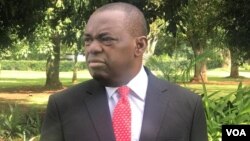
Zimbabwe’s Foreign Affairs Minister, Sibusiso Moyo, says chaos and violence at Capitol Hill in Washington DC last Wednesday should serve as a wake up call for America, which is widely regarded as an icon of democracy.
In a statement, Moyo said the violence by supporters of President Donald Trump, who wanted to block the confirmation of Joseph Biden as next leader of the country following the November presidential election, should result in US policy makers to make a “sober reflection and the emergence of a less prescriptive style of engagement with countries such as Zimbabwe”.
“For a nation which prides itself on the democratic example it sets for others, and which judges and often punishes others for failing to meet its lofty standards of moral rectitude and governance, the events of January 6 must surely have come as a massive reality-check: a stark reminder that all is far from well within the heart and soul of the self-styled ‘leader of the free world’; that America itself is failing to meet the very benchmark standards it demands of all others; and a clear demonstration that its governance systems and institutions are far from infallible.
Moyo said President Emmerson Mnangagwa’s government expects the USA to completely change its engagement policies with Zimbabwe.
“Our hope, as Zimbabweans, is that the reality of such deliberate politically-motivated violence; the reality of systems-failure and institutional fallibility – especially now, as a new administration takes office in Washington — may lead to a period of sober reflection among US policy and decision-makers, and the emergence of a different, less prescriptive style of US engagement with others — including Zimbabwe.”
The United States and its allies imposed targeted sanctions on some Zanu PF officials and companies citing alleged election rigging and human rights abuses. About 88 individuals and 37 companies are currently under the restrictive measures.
Zimbabwe hopes that the incoming Biden administration will improve its relations with the southern African nation currently gripped by record hyperinflation and
“We look forward to working closely with the incoming Biden Administration, and its Africa team, to inject new impetus into our re-engagement efforts and to continue the task of rebuilding a strong, productive bilateral relationship based on mutual understanding and respect. Just as we are very confident that Americans will swiftly move past the ugliness and chaos of January 6 and the deep polarisation which characterizes.
“US society today, so too are we confident that Zimbabwe and the United States will indeed find one another and succeed in rekindling the multi-faceted, co-operative and mutually beneficial relationship we once enjoyed.”
The USA has over the years pressed Zimbabwe to conduct sweeping political reforms before targeted sanctions are lifted.
House Likely to Offer Articles of Impeachment Against Trump on Monday

Efforts to hold President Donald Trump accountable for his role in inciting the mob that overran the U.S. Capitol on Wednesday gained momentum Saturday, with Democratic members of the U.S. House of Representatives announcing they will offer articles of impeachment as early as Monday.
Rep. Ted Lieu, a Democrat from the state of California, who helped draft the charges against Trump, tweeted Saturday afternoon that the articles had 180 co-sponsors, although no Republicans were among them.
UPDATE to the update: We’ve just hit 180 cosponsors of the Article of Impeachment drafted by Rep @davidcicilline, @RepRaskin, me and @HouseJudiciary staff.
— Ted Lieu (@tedlieu) January 9, 2021
We will introduce the Article of Impeachment this Monday during the House’s pro forma session. https://t.co/qm7LmXhOgK
Speaker of the U.S. House of Representatives Nancy Pelosi and her colleagues are anxious to see the president removed from office before his term ends Jan. 20, even though the Republican-led U.S. Senate is unlikely to agree.
“The situation of this unhinged president could not be more dangerous, and we must do everything that we can to protect the American people from his unbalanced assault on our country and our democracy,” Pelosi said Friday.
If the House were to impeach the president, for a second time, that would trigger a trial in the Senate, which has acquitted Trump once before and is to be in recess until Jan. 19. Democrats will take control of the Senate later this month.
Democratic congressional leaders also have called on Vice President Mike Pence to invoke the 25th Amendment, which offers an alternative and perhaps quicker way to remove the president from office. Pence has not responded but has reportedly told colleagues he does not favor such action.
Passed in the 1960s, the 25th Amendment to the U.S. Constitution allows for the temporary transfer of power from the president to the vice president if the president is incapacitated, with the approval of a majority of the Cabinet. But analysts say that option could be difficult to exercise with just days left in Trump's presidency.
“It's also very difficult in a situation in which the president is not in a coma or not otherwise physically incapacitated that he can't function or operate because under the 25th Amendment, once it is invoked the president can notify Congress that he is able to discharge the powers of the office and take that power back,” said John Hudak, a senior fellow in governance studies at the Brookings Institution.
An overwhelming number of Democratic lawmakers – and some Republicans – have expressed support for removing Trump from power or censuring his actions.
Sen. Lisa Murkowski of Alaska has called for Trump to resign, making her the first Republican senator to endorse a presidential resignation.
“I want him to resign,” she told The Anchorage Daily News. “I want him out. He has caused enough damage."
“He hasn't been focused on what is going on with COVID,” Murkowski said. “He's either been golfing, or he's been inside the Oval Office fuming and throwing every single person who has been loyal and faithful to him under the bus, starting with the vice president. ... He needs to get out.”
Pennsylvania Sen. Pat Toomey declined Saturday on Fox News to commit to voting in favor of Trumps removal despite saying he had “committed impeachable offenses.” However, Nebraska Sen. Ben Sasse told CBS News that he would definitely consider impeachment.
But House Republican Leader Kevin McCarthy indicated he does not support impeachment.
President-elect Joe Biden has said Trump wasn’t fit for office, but he declined to endorse Democratic calls that he be impeached for a second time. Biden said the situation would be different if Trump were not leaving office in less than two weeks.
“If we were six months out, we should be doing everything to get him out of office. Impeaching him again, trying to evoke the 25th Amendment, whatever it took,” Biden said. “But I am focused now on us taking control as president and vice president on the 20th and to get our agenda moving as quickly as we can.”
Trump was impeached on charges of abuse of power and obstruction of Congress in December 2019 but was acquitted in a trial in the U.S. Senate in February 2020. No American president has ever faced two impeachment votes.
“There are two reasons to pursue impeachment,” said Paul Berman, a professor of law at the George Washington University School of Law. “One is simply to make it clear that a sitting president inciting an insurrection against the United States government is perhaps the worst thing that a president could ever possibly do. And that statement needs to be made. Second, and more pragmatically, if he were impeached, and convicted, that would prevent him from running for office in the future.”
White House Pushed Top Federal Prosecutor in Atlanta to Resign, Paper Says

The White House pushed the top federal prosecutor in Atlanta to resign before Georgia’s U.S. Senate runoff because President Donald Trump was unhappy that he wasn’t doing enough to investigate Trump’s unfounded claims of election fraud, The Wall Street Journal reported Saturday.
The Justice Department on Tuesday tapped a new federal prosecutor to lead the Atlanta office, a day after the Trump-appointed U.S. Attorney for the Northern District of Georgia, Byung J. “BJay” Pak, abruptly resigned.
Pak’s resignation drew attention because Trump appeared to refer to him in a recent phone call with Georgia’s secretary of state in which the outgoing Republican president asked state officials to try to “find” enough votes to overturn the results of the Nov. 3 election he lost to Democrat Joe Biden.
In a recording obtained by numerous media outlets, Trump appeared to complain during the call about Pak without naming him, saying there was a “Never Trumper U.S. attorney” in Georgia.
The Journal, citing people familiar with the matter, said that at the behest of the White House, a senior Justice Department official called and told Pak he needed to step down because he was not pursuing the voter-fraud allegations to Trump’s satisfaction.
The White House declined to comment while the Justice Department and Pak did not respond to Reuters’ requests for comment on Saturday.
Democrat Raphael Warnock defeated Republican incumbent Kelly Loeffler and Democrat Jon Ossoff unseated Republican David Perdue in Tuesday’s runoffs, giving Democrats control of the U.S. Senate.
Pro-Trump State Lawmaker Among Rioters Charged with Storming US Capitol
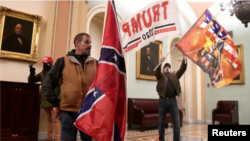
A pro-Trump state lawmaker who filmed himself storming the U.S. Capitol and an Arkansas man who was photographed with his foot on the desk of House Speaker Nancy Pelosi are among more than a dozen rioters charged so far by federal prosecutors as part of a far-ranging investigation into Wednesday’s attack on the Capitol, federal officials announced Friday.
Derrick Evans, a Republican member of the West Virginia House of Delegates, was charged with entering a restricted area on the Capitol grounds. Evans broadcast a Facebook Live video of himself breaking into the building with a crowd of rioters, at one point saying, “We’re in, we’re in, baby.” In an earlier video posted on Facebook, Evans warned that the rioters would storm the building.
The West Virginia lawmaker’s participation in the riots has prompted calls for his resignation and drew criticism from the state governor.
Evans could not be immediately reached. But his lawyer, John Bryan, said in a statement to CNN on Thursday that "it wasn't apparent to Mr. Evans that he wasn't allowed to follow the crowd into this public area of the Capitol, inside which members of the public were already located."
Arkansas resident Richard Barnett’s photograph, showing him smirking and seated at Pelosi’s desk, became an iconic image of the rioting, the first mass attack on the U.S. Capitol in more than two centuries.
Barnett, 60, was arrested in Little Rock, Arkansas, Friday morning and charged with entering the speaker’s office where he took some of Pelosi’s mail and left behind a note, federal officials said. He faces three counts: knowingly entering and remaining in restricted grounds; violent entry and disorderly conduct on Capitol grounds; and theft of public money or public property, according to court documents released on Friday.
Barnett told a local television outlet in Arkansas that he was looking for a bathroom when he entered the speaker’s office. He claimed that he bled on an envelope on Pelosi’s desk and took it while leaving a quarter as compensation.
The two men are among 13 people charged so far in federal court in the District of Columbia in connection with the rioting. The charges were filed on Thursday and unsealed on Friday. In addition, about 40 others were charged in the D.C. superior court, the majority of them for illegal entry and curfew violations.
Among those charged in federal court, Lonnie Coffman, a 70-year-old Alabama resident, was charged with possession of an unregistered firearm and carrying a pistol without a license. Inside his pickup truck parked behind the Capitol, police on Wednesday found 11 Molotov cocktails that an official said “would essentially constitute homemade napalm.”
FBI Director Christopher Wray stressed that the charges announced so far “are just the beginning of the FBI’s ongoing efforts to hold those responsible” for Wednesday’s riots.
“We will continue to aggressively investigate each and every individual who chose to ignore the law and instead incite violence, destroy property and injure others,” Wray said in a statement.
Ken Cole, the first assistant U.S. Attorney for the District of Columbia, said that the Justice Department assigned hundreds of prosecutors and agents to what is a fluid, 24/7 operation to identify and arrest the perpetrators.
“The department will spare no resources in our efforts to hold all of these people accountable, and it's going to be something that we'll be continuing to work on, in the coming hours, days and weeks as we pursue this investigation,” Cole told reporters on a press call.
The rioting and looting erupted Wednesday afternoon as hundreds of supporters of President Donald Trump, angry over Trump’s loss to Joe Biden in the November 3 election, stormed the Capitol that contains the House and Senate while lawmakers were meeting in a joint session to certify Biden’s victory.
Trump for weeks has falsely claimed that he won the election in a landslide but was robbed of his victory – a claim believed by many of his followers. During a rally near the White House on Wednesday, Trump urged thousands of his supporters to march to the Capitol to protest the election results.
The subsequent violence, which left five dead, including a police officer, temporarily halted the certification process, but lawmakers returned to the chambers later in the evening to certify Biden as the next president of the United States and Kamala Harris as the next vice president.
Trump was widely condemned for inciting the violence by encouraging his supporters to march on the Capitol. In a rare rebuke, former Attorney General William Barr, a staunch Trump ally while in office, said in a statement that the president's conduct "was a betrayal to his office and supporters."
Asked if federal prosecutors were examining Trump's role in inciting the violent assault on the Capitol, U.S. Attorney Michael Sherwin told reporters Thursday, "We're looking at all actors here and anyone that had a role and the evidence fits the elements of a crime, they're going to be charged."
Just how many people will ultimately face charges remains uncertain. Capitol Police has said “thousands of individuals” were involved in “riotous” acts, with hundreds storming the building. With Capitol police letting nearly everyone walk free, federal investigators are now facing the daunting task of tracking them down around the country.
Cole said investigators have yet to determine how many people traveled to Washington to take part in the attack on the Capitol and the extent to which it was a coordinated act.
“We're not going to know that until we get to the end of the investigation,” he said.
Trump Says He Will Not Attend Biden’s Inauguration

U.S. President Donald Trump tweeted Friday he will not attend President-elect Joe Biden’s inauguration, breaking a tradition that has for centuries been a hallmark of the peaceful transfer of power from one administration to the next.
Two days after infuriated Trump supporters overran the U.S. Capitol during Congressional proceedings to formally certify Biden’s win, Trump wrote, “I will not be going to the Inauguration on January 20th.”
To all of those who have asked, I will not be going to the Inauguration on January 20th.
— Donald J. Trump (@realDonaldTrump) January 8, 2021
Less than one day earlier, he had issued a video promising to devote his remaining time in office to a “smooth, orderly and seamless transition of power” to Biden.
Trump will be the first sitting U.S. president since Andrew Johnson to skip the ceremony. Johnson did not to attend his successor’s swearing-in 152 years ago.
Despite his long overdue acknowledgment Thursday that Biden will take office this month, Trump continues to insist that he was cheated out of a second term in office. Officials in his administration -- including former Attorney General William Barr -- have affirmed there is no evidence of significant voter fraud that would have made Trump the winner.
Vice President Mike Pence, one of the president’s most faithful supporters until they publicly broke this week, is expected to attend the inauguration, according to reports citing sources close to the vice president. Trump now believes Pence betrayed him by failing to block Congress’ certification of the election result – something Pence could not legally do.
The Biden transition team did not immediately comment on Trump’s announcement, but it has been urging people for weeks not to attend the Washington event in person, primarily because of the worsening coronavirus crisis.
After Wednesday’s assault on Capitol Hill by Trump supporters, security for Biden’s inauguration is expected to be especially tight.
Trump gave no indication of how he would spend his last days in the White House.
With less than two weeks to go before Biden is sworn in, a growing number of congressional Democrats are pushing to force Trump out of office before his term ends, maintaining he is unfit to continue to serve as president.
Pelosi, Top General Discuss Preventing Trump Military Actions
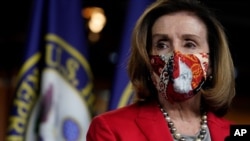
Amid growing concerns about what U.S. President Donald Trump might do during his last days in office, House Speaker Nancy Pelosi said Friday that she had asked a top Pentagon general what measures were in place to prevent the president from launching a nuclear weapons attack.
The possibility, while seemingly remote, may be a consideration in a drive by Pelosi and some other national leaders to remove Trump from office even before his term in office ends on January 20.
“This morning, I spoke to the Chairman of the Joint Chiefs of Staff Mark Milley to discuss available precautions for preventing an unstable president from initiating military hostilities or accessing the launch codes and ordering a nuclear strike,” Pelosi wrote in a letter to her Democratic Party colleagues in the House of Representatives.
“The situation of this unhinged president could not be more dangerous, and we must do everything that we can to protect the American people from his unbalanced assault on our country and our democracy.”
Asked to confirm the call had taken place, a spokesman for Milley told VOA, “He answered her questions regarding the process of nuclear code authority.”
The spokesman did not elaborate on what was said during the call.
Illegal order
The president has sole authority to order the launch of a nuclear weapon and does not require the approval of Congress or his military advisers. But if a military commander were to determine, on advice of his lawyers, that such an order was illegal, then the order could be refused.
Past and present Pentagon leaders have also said they would not obey an illegal order from the president.
Pelosi and her colleagues are also anxious to see the president held accountable for his role in inciting the mob that overran the U.S. Capitol this week, delaying the certification of the election of President-elect Joe Biden and leading to the deaths of five people, including a Capitol Police officer.
A move to impeach Trump for the second time – if he was convicted in the Republican-led Senate — would also have the effect of preventing him from ever again holding federal office.
Democratic congressional leaders have also called on Vice President Mike Pence to invoke the 25th Amendment, which offers an alternative and perhaps quicker way to remove the president from office. Pence has not responded but has reportedly told colleagues he does not favor such action.
Passed in the 1960s, the 25th Amendment to the U.S. Constitution allows for the temporary transfer of power from the president to the vice president if the president is incapacitated, with the approval of the majority of the Cabinet. But analysts say that option could be difficult to exercise with just days left in Trump's presidency.
Power can be reclaimed
“It's also very difficult in a situation in which the president is not in a coma or not otherwise physically incapacitated so that he can't function or operate, because under the 25th Amendment, once it is invoked, the president can notify Congress that he is able to discharge the powers of the office and take that power back,” said John Hudak, a senior fellow in governance studies at the Brookings Institution.
Senate Minority Leader Chuck Schumer and Pelosi warned that if Pence did not take action, congressional Democrats would pursue a vote on articles of impeachment.
“The president’s dangerous and seditious acts necessitate his immediate removal from office,” Schumer and Pelosi said Thursday.
An overwhelming number of Democratic lawmakers – and some Republicans – have expressed support for removing Trump from power or censuring his actions. But following Pelosi’s remarks, House Republican leader Kevin McCarthy indicated he did not support impeachment.
“Impeaching the president with just 12 days left in his term will only divide our country more,” he said.
McCarthy said he had reached out to Biden to plan to speak with him about how to work together to lower tensions and unite the country.
Five people died as a result of the riot Wednesday at the U.S. Capitol. The president’s supporters overwhelmed Capitol Police to try to stop a joint session of Congress from counting the electoral votes and certifying Biden’s win.
Earlier in the day, Trump held a rally on the National Mall and encouraged his supporters to protest the results. The massive security breach by the pro-Trump rioters marked the first time the U.S. Capitol had been invaded since the British entered it during the War of 1812.
Trump was impeached on charges of abuse of power and obstruction of Congress in December 2019 but was acquitted in a trial in the Senate in February 2020. No American president has ever faced two impeachment votes.
Two reasons given
“There are two reasons to pursue impeachment,” said Paul Berman, a professor at the George Washington University School of Law. “One is simply to make it clear that a sitting president inciting an insurrection against the United States government is perhaps the worst thing that a president could ever possibly do. And that statement needs to be made. Second, and more pragmatically, if he were impeached, and convicted, that would prevent him from running for office in the future.”
While it is unlikely U.S. lawmakers have time to return to work to enact the complicated procedures for an impeachment before the end of Trump’s term, analysts say a Senate trial could be held after the president leaves office.
“There's nothing that I can see in the Constitution that would prevent an impeachment trial and conviction from happening in the days after he leaves office,” Berman said. “We need to create accountability that a president cannot do what he did and also because we want to prevent him from holding office ever again.”






